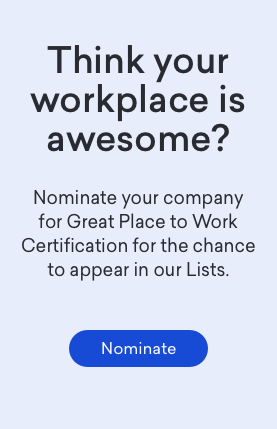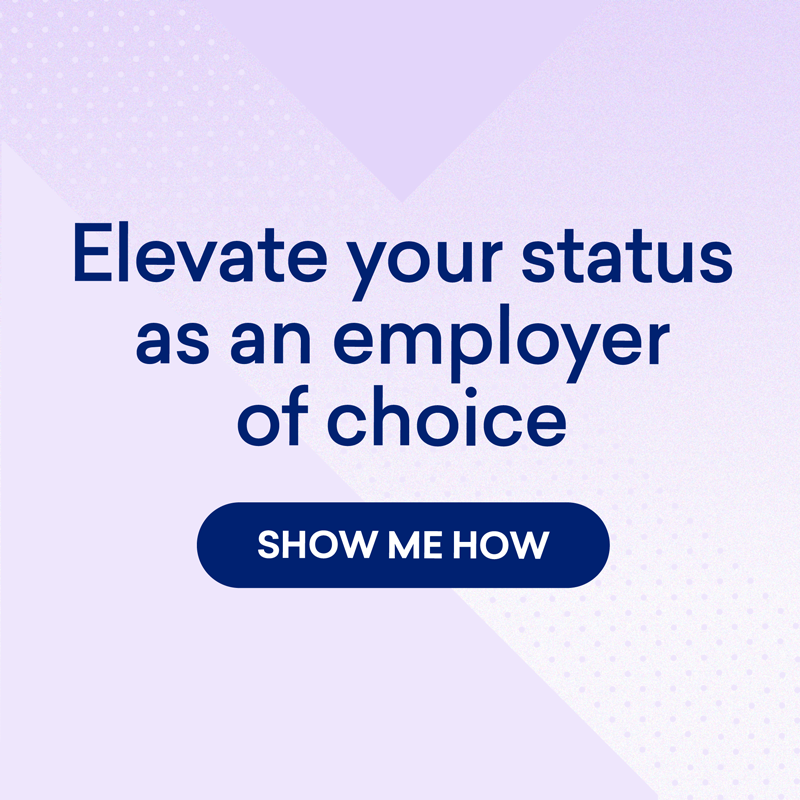Are You Focusing Cultural Efforts for the Most Impact?
There are certain areas where, practically speaking, great workplaces stand out head and shoulders above the rest. What are these areas, and why is it important that your organization focus on them?
As a part of the assessment process for the Fortune 100 Best Companies to Work For List, we at Great Place to Work® ask companies to answer 15 essay questions to allow us to assess the cultural programs, policies, and practices to determine if they are list-worthy.
These essay questions are aligned with the practice areas we know are critical to building an employee experience characterized by trust, pride, and camaraderie – in other words, the pillars of a great workplace culture. Investing time and energy into developing these areas will help organizations streamline focus, and maximize impact, towards developing a workplace that employees would characterize as a "great" one.
What We Ask - And Why We Ask it
1. Hiring: What characteristics do you look for in new employees?
Why We Ask: Because companies that care about their cultures are extraordinarily selective in who they hire, and attend to a candidate's skill set and culture fit. Hiring practices will include opportunities to engage the candidate with many different people in the company, and clearly tie in with the organization's culture, values, and mission.
Example: As a part of their extensive hiring process, Best Company Baptist Health South Florida uses a custom behavioral assessment tool. The behavioral assessment looks at candidates in comparison to profiles of existing high-performing employees at Baptist. Developing these profiles is an inclusive process, involving both employees and leaders alike.
2. Welcoming: How do you welcome new employees and integrate them into your culture?
Why We Ask: Because great workplaces use distinct and varied methods of giving all new hires a warm welcome, integrating them into the culture from Day One.
Example: At Best Company Quicken Loans, CEO Bill Emerson and Chairman Dan Gilbert lead a full-day session with all new employees to review the company's book on culture, "ISMs in Action."
3. Inspiring: How do you inspire employees to feel that their work has meaning?
Why We Ask: Because at organizations with great cultures, employees feel connected to a shared purpose when they come to work each day. Programs are in place that help foster pride, and show employees the value of their work for customers and for society overall.
Example: In Best Company KPMG's "Higher Purpose Initiative," associates submit stories demonstrating how, through their work at KPMG, they have made a positive difference in the world. Stories are shared using electronic, print, video, and social media.
4. Speaking: What are distinctive ways senior management shares information, including bad news?
Why We Ask: Because leaders at great workplaces understand the important role that sharing information plays in maintaining a trust-based relationship with employees. Transparency, accessibility and warmth are all aspects we see incorporated into information sharing at the Best.
Example: At Best Company Insomniac Games, when the company has an important announcement, an email is sent out to all employees, followed by the President and CEO talking with groups in person and answering questions.
5. Listening - Upward Communication: What are the ways in which employees can ask questions, provide feedback, or otherwise communicate with managers, especially senior managers?
Why We Ask: Because just as being informed is an important component of trust-building, so is offering employees the opportunity to ask questions of leaders. Organizations scoring highly on this question demonstrate a sincere interest in hearing employee feedback, and offer a variety of methods for doing so.
Example: Employees at Best Company Credit Acceptance can find the "Red Tape Remover" button on the home page of their intranet, which sends a direct "red tape remover request" email to CEO, Brett Roberts, regarding issues that must be addressed. All emails are ensured a prompt response from Roberts or another senior leader.
6. Listening - Collaborating: What programs are available for employees to make suggestions and/or become involved in making decisions that affect their jobs, work environment, or the direction of company as a whole?
Why We Ask: Because involving employees in decisions that affect them demonstrates respect for employees, thereby strengthening the level of trust in the workplace. Leaders of great workplace cultures are not afraid to provide channels for employees to give appropriate levels of input.
Example: Best Company Southern Ohio Medical Center includes all employees in company discussions about financial challenges, a practice that has enabled them to gain invaluable insights and innovative ideas on ways to curb expenses and generate revenue.
7. Listening - Appeals: How can employees address an undesirable workplace situation or resolve conflicts with their manager(s)?
Why We Ask: Because great workplaces are fair workplaces, and provide a variety of channels that are open to all employees to report situations that they may need special help in addressing.
Example: Best Company Wegmans Food Markets offers the You First help line--a confidential, third-party operated, toll-free phone number to express concerns or report conflicts if employees feel they need a fully external or anonymous solution provider.
8. Thanking: How does your company show appreciation and/or recognition for employees' good work and extra effort, or other achievements?
Why We Ask: Because when employees are appreciated for their work, they know that they are valued and respected as an important part of the organization. Great workplaces embrace a culture of appreciation, and offer a variety of programs that give all employees that opportunity to be frequently recognized.
Example: Best Company Etsy has an anonymous entity called the Ministry of Unusual Business, which lets managers nominate anyone in the company for a token of appreciation. They can email the Ministry, who will then anonymously send the nominee a gift (often an item the nominee has favorited on Etsy) and card with a message written by the individual who nominated them.
9. Developing: How does your company help employees discover and develop their talents, challenge themselves professionally, manage their careers, and/or enhance their personal growth?
Why We Ask: Because when leaders value their employees as a critical part of the company's success, they treat training and development as a top priority. Great workplaces foster a culture of learning, and provide all employees a variety of channels to further both their professional growth and personal interests.
Example: Best Company Cisco's "SAM" (Stretch Assignment Marketplace), lets employees search for opportunities that will push them past their comfort zones in a positive way, helping them broaden their expertise by taking on assignments that expose them to new experiences and skills.
10. Caring - Balancing: In what distinctive ways does your company help employees balance their work lives with their personal and/or family lives?
Why We Ask: Because great workplaces make it clear that they care for employees as full human beings—not just as employees. These organizations provide a range of work/life benefits and programs that all employees have access to, and that support a wide variety of individual needs.
Example: Best Company Clif Bar & Co. offers employees 2.5 hours of paid time each week to work out at the company's onsite fitness center.
11. Caring - Supporting: How does your company support employees at times of significant life events – a personal crisis, family illness, birth, marriage, etc.?
Why We Ask: Because great workplaces understand that "life happens," and will go above and beyond to care for their employees when it does. These organizations have a variety of programs that are available to employees during significant life events.
Example: Through their "Serve the Reserve" program, Best Company Capital One provides support to Capital One associates and their families during times of military separation. Support includes such things such as: care packages, arranging video teleconferencing, social activities for the family, and help around the house.
12. Caring - Including: Describe your company's programs and/or policies intended to promote diversity and/or inclusion.
Why We Ask: Because truly great workplaces are great for everyone who works there, showcasing a variety of programs and practices that foster a diverse workforce and promote inclusion at all levels.
Example: When a region at Best Company Whole Foods Market expressed a need to better support transgender Team Members' needs, a task force was assembled to research and put together training and materials for store leaders to create a more inclusive, comfortable environment for all Team Members.
13. Celebrating: How do you encourage fun and camaraderie among your employees?
Why We Ask: Because great workplaces understand that camaraderie and fun are essential to great culture, and find many excuses to have fun and celebrate.
Example: At Best Company L.L. Bean, employees celebrate Team Days, which are fun-filled outings for groups and teams. Activities such as archery, fly fishing, kayaking, geocaching, and hiking are typical offerings, so employees of all abilities can participate.
14. Sharing - Rewards: How does your company promote a sense of fairness within the organization? In particular, we are interested in: Methods for compensating employees, and policies and/or practices that promote a sense of equity between employees and managers.
Why We Ask: Because promoting a sense of fairness across the company is a fundamental component of a trust-based culture. Great workplaces focus efforts on ensuring that their compensation-related activities are fair, well-communicated, and inclusive.
Example: At Best Company General Mills, annual incentive payments extend to all nonunion employees, from production workers in the plants to senior management. Employees receive an Annual Performance and Rewards Statement that shows exactly how the payment was calculated.
15. Sharing - Community: Please briefly describe your organization's philanthropic, environmental, or other corporate social responsibility initiatives, focusing on how employees participate in and/or derive value from these efforts.
Why We Ask: Because great workplaces demonstrate a sense of care that extends beyond their immediate workforce and customers. Such organizations have a variety of philanthropic programs and practices that they actively encourage employees to participate in, and that often tie into the mission and values of the company.
Example: As part of their Military Appreciation Month celebration in May, employees at Best Company Navy Federal Credit Union send thank you notes to servicemen and women.
How does your organization stack up in these areas? Would you rock the 100 Best Companies to Work For application? If you think your culture deserves a spot on the 2016 list, or if you're simply wondering how your culture would benchmark against the Best, consider nominating your company today.
Nominations for the 2016 Fortune 100 Best Companies to Work For List are being accepted through Friday, July 31, 2015.
Jessica Rohman is Senior Content Producer at Great Place to Work®.














